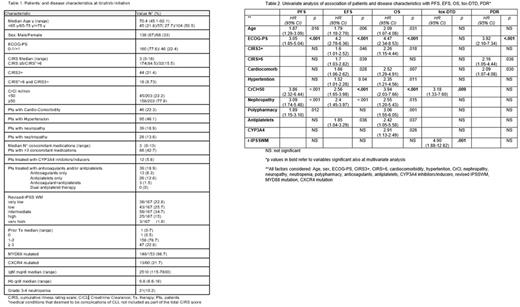Abstract
Introduction: Although Waldenstrom Macroglobulinemia (WM) typically affects the elderly, no studies so far have specifically addressed the impact of age, comorbidities, ECOG-PS and concomitant medications on treatment outcomes. Data on WM receiving ibrutinib outside of clinical trials are sparse, showing 18-20% and 8-35% of pts requiring permanent dose reduction (PDR) and toxicity-related definitive treatment discontinuation (Tox-DTD). Furthermore, the impact of polypharmacy and drug interference while on ibrutinib is still unexplored. The aim of this study is to evaluate which fitness parameters are significant for treatment outcome and management in patients with WM receiving ibrutinib in clinical practice.
Methods: This is a multicenter retrospective study analyzing the impact of age (≥75y), CIRS (>6), major CIRS comorbidity (at least one organ with a CIRS score ≥3, CIRS3+), ECOG-PS (>1), polypharmacy (>3 concomitant medications), type of concomitant medications, CrCl (<30; <50 ml/min), baseline nephropathy, cardiopathy, hypertension, neuropathy, neutropenia and disease characteristics on tox-DTD; PDR; PFS, EFS (event: tox-DTD, PDR, progression, death) and OS. Medical conditions that were deemed to be complications of WM and WM diagnosis itself, were not included in CIRS score calculation.
Results: From Aug 2016 to Apr 2022, 206 pts were included in the analysis. Pts' characteristics are reported in table 1. After a median follow up of 26.6 mo (range 0.5-70.5 mo), 139 pts (67.5%) are still on ibrutinib. Treatment temporary interruption occurred in 60 pts (29.6%) for a median of 18 consecutive days. Overall, 67 pts discontinued ibrutinib due to: PD in 30 (14.6%); toxicity in 23 (11.2%, Tox-DTD); other reasons in 14 (6.8%). Median time to Tox-DTD was 7.5 mo with recurrent atrial fibrillation (AF) in 10/23 pts being the most common recorded toxicity.
Fifty-three pts (25.7%) required ibrutinib dose reduction at least once, followed by PDR in 40 (19.4%) of them. AF and diarrhea were the most common reasons for PDR both occurring in 7 pts. Median time to PDR was 7.1 mo.
Pts with very-high revised-IPSSWM and CrCl<50 showed higher risk of Tox-DTD, that was confirmed also at multivariate analysis (p .002 and p .025, respectively). While ECOG-PS>1, CIRS>6 and cardiocomorbidity significantly influenced PDR at univariate analysis, only ECOG-PS maintained its independent role (p <.001). Number and type of concomitant medications had no impact on ibrutinib management.
Median PFS, EFS and OS for the whole population were not reached and resulted 73.3%, 54.1% and 85.3% at 2 years, respectively. Age, ECOG-PS, CrCl>50 and nephropathy negatively predicted all survival outcomes at univariate analysis. The presence of major comorbidities, but not CIRS>6 impacted on OS. At Cox proportional regression hazard model, only ECOG-PS>1 confirmed its role on PFS, EFS and OS (p <.001), while CrCl<50 was significant for EFS (p .007) and OS (p .003). Among baseline disease characteristics CXCR4 mutation was the only factor independently associated with progression (p .023). Results from univariate analysis are summarized in Table 2.
PFS was significantly impacted by PDR (p<.0001), also showing a trend in pts temporarily interrupting ibrutinib (p .053).
Conclusions: To our knowledge this is the first series analyzing the role of age, comorbidities and concomitant medications in patients with WM receiving ibrutinib. Poor ECOG-PS and compromised renal function emerged as significant prognostic baseline parameters on both treatment management and survival. High comorbidity burden (CIRS>6) but not presence of major comorbidity shows to associate with schedule modifications. Age per se did not result as a risk factor for toxicity-related discontinuations or dose reductions, nevertheless pts with very-high revised-IPSSWM, that includes age in its score calculation, were at higher risk of Tox-DTD. Importantly, as per our data neither polypharmacy, nor type of concomitant medication interfere with ibrutinib management.
Disclosures
Ferrero:Jannsen: Consultancy, Membership on an entity's Board of Directors or advisory committees, Research Funding, Speakers Bureau; EUSA Pharma: Consultancy, Membership on an entity's Board of Directors or advisory committees, Speakers Bureau; Incyte: Membership on an entity's Board of Directors or advisory committees; Morphosys: Research Funding; Gilead: Research Funding; Gentili: Speakers Bureau; Clinigen: Membership on an entity's Board of Directors or advisory committees; Servier: Honoraria, Speakers Bureau. Reda:Janssen, Abbive, Astra Zeneca, Beigene: Consultancy. Puccini:Takeda: Membership on an entity's Board of Directors or advisory committees; Beigene: Membership on an entity's Board of Directors or advisory committees. Varettoni:ABBVIE: Honoraria, Membership on an entity's Board of Directors or advisory committees, Other: travel expenses; ASTRAZENECA: Membership on an entity's Board of Directors or advisory committees; BEIGENE: Membership on an entity's Board of Directors or advisory committees, Other: travel expenses; JANNSEN: Membership on an entity's Board of Directors or advisory committees, Other: travel expenses. Cairoli:Novartis, Celgene: Speakers Bureau; Gilead Sciences: Other: Travel, Accommodations; Celgene, AbbVie, Daiichi Sankyo, Novartis: Consultancy. Tedeschi:AstraZeneca: Consultancy, Honoraria, Other: Travel, Accommodations, Expenses, Speakers Bureau; Janssen: Consultancy, Honoraria, Other: Travel, Accommodations, Expenses, Speakers Bureau; Beigene: Consultancy, Honoraria, Other: Travel, Accommodations, Expenses, Speakers Bureau; AbbVie: Consultancy, Honoraria, Other: Travel, Accommodations, Expenses, Speakers Bureau.
Author notes
Asterisk with author names denotes non-ASH members.


This feature is available to Subscribers Only
Sign In or Create an Account Close Modal